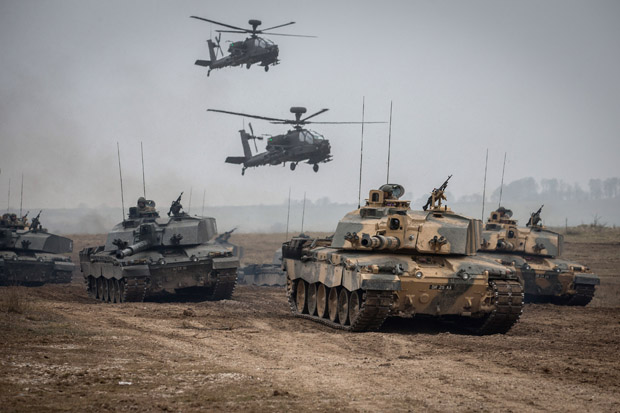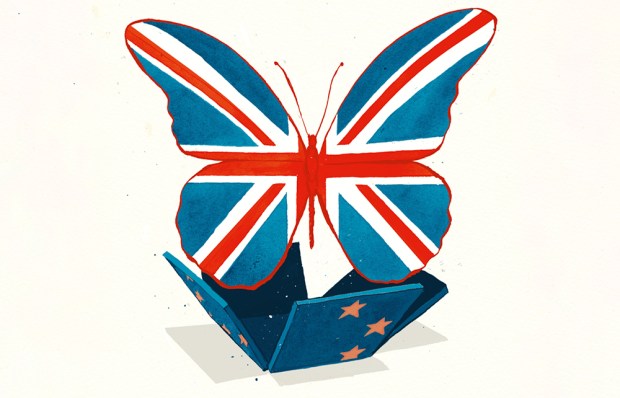With the exception of 1983, when Michael Foot promised unilateral nuclear disarmament, defence has played little role in modern election campaigns. This is not least because the two main parties appear to have developed a non-aggression pact. They have agreed to heap praise upon the armed forces and commit them to ever more frequent foreign campaigns — while simultaneously nibbling away at the defence budget to fund programmes which offer more instant gratification to the electorate.
This week, as the news emerged of Russia’s plan to lease 12 long-range bombers to Argentina, the Defence Secretary, Michael Fallon, announced the results of the latest review into how we protect the Falkland Islands. He promised to spend £180 million over ten years improving the military base on the islands, including better housing and a new primary school. While that is all welcome, it does not address an underlying deficiency of our armed forces: we are trying to defend the legacy of Britain’s centuries as a great maritime power with a navy that is a shadow of its former self. Our military is shrinking, and our stature along with it.
The task force sent to reclaim the Falklands in 1982 included two aircraft carriers, eight destroyers and 15 frigates. The entire British Navy now comprises one hulk of an aircraft carrier without any aircraft, six destroyers and 13 frigates. Naval bases have been turned into museums and waterfront housing developments. To a cross-channel ferry passenger leaving Portsmouth, it looks all too much as if a cack-handed manoeuvre on the part of the ferry captain could wipe out half the British Navy. True, a properly functioning air base on the Falklands is of more value than an entire flotilla of aircraft carriers 10,000 miles away, as was emphasised in 1982 — when the success of the campaign served to smother criticism of the woeful neglect of the islands’ defences before the invasion.
Nevertheless, the argument that we can get away with lower defence spending because we now have smarter defences, better targeted at the threats we are likely to face, is far from convincing. For 40 years during the Cold War we, along with the rest of Nato, meant what we said when we warned the Soviet Union that an attack on one of us would be treated as an attack on us all. There is considerable doubt that we mean it now, in a Nato whose expansion eastwards in membership has not been matched by an expansion of forces. Vladimir Putin certainly seems disinclined to believe it, to judge by the frequency with which Russian aircraft have started buzzing Europe’s skies.
Current levels of defence spending are still heavily influenced by the decision, in the early 1990s, to draw a ‘peace dividend’ from the end of the Cold War. In 1991/92, the UK was spending 4.1 per cent of GDP on defence. By 2000 that had fallen to 2.4 per cent. It rose a little bit during Tony Blair’s military adventures in Iraq and Afghanistan but has since fallen back to that same level: 2.4 per cent of GDP. The government has made no promise to maintain it above 2 per cent — supposedly the minimum required under Nato’s rules — beyond next year.
It is little consolation that other European countries are even more reluctant to spend on defence. Apart from the UK, only Greece and Estonia spent 2 per cent of GDP on defence in 2013. For far too long Europe has been happy to live under the implicit guarantee that the US will defend it. Little consideration has been given to the prospect that US taxpayers may eventually get fed up with this arrangement. They, too, might one day decide they would rather cut back on defence spending in Europe in favour of social spending at home — or even a tax cut.
Moreover, while we can still probably rely on US involvement in the defence of Europe, the same is certainly not true of the Falklands or any other British overseas possessions. Even Ronald Reagan, as staunch an ally as Britain has enjoyed in the White House since 1945, showed little interest in aiding the liberation of the islands.
There is a way out of the budgetary mess in which the government finds itself. As Rory Stewart, chairman of the defence select committee, has argued, some of what goes under ‘defence’ spending — such as peacekeeping missions in developing countries — could equally well go under the aid budget. There is no point in channelling food, medical or other development aid into war zones where it cannot be distributed or where it will be stolen by military forces.
It is never wise for a government to define success purely in terms of money spent — a 2 per cent target for defence spending is no more a guarantee that money will be well spent than is the 0.7 per cent target for aid spending. But it is ludicrous to enshrine in law the duty of governments to spend so much on aid while refusing to guarantee defence spending at a level compatible with the protection of the UK and overseas territories. At least some of the aid budget should be redirected into defence.
Got something to add? Join the discussion and comment below.
Get 10 issues for just $10
Subscribe to The Spectator Australia today for the next 10 magazine issues, plus full online access, for just $10.
You might disagree with half of it, but you’ll enjoy reading all of it. Try your first month for free, then just $2 a week for the remainder of your first year.














Comments
Don't miss out
Join the conversation with other Spectator Australia readers. Subscribe to leave a comment.
SUBSCRIBEAlready a subscriber? Log in